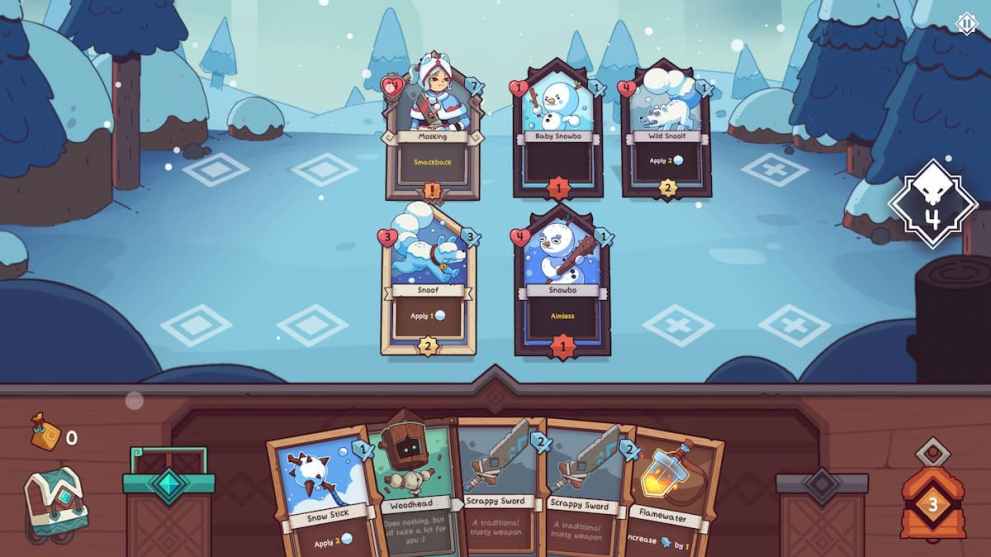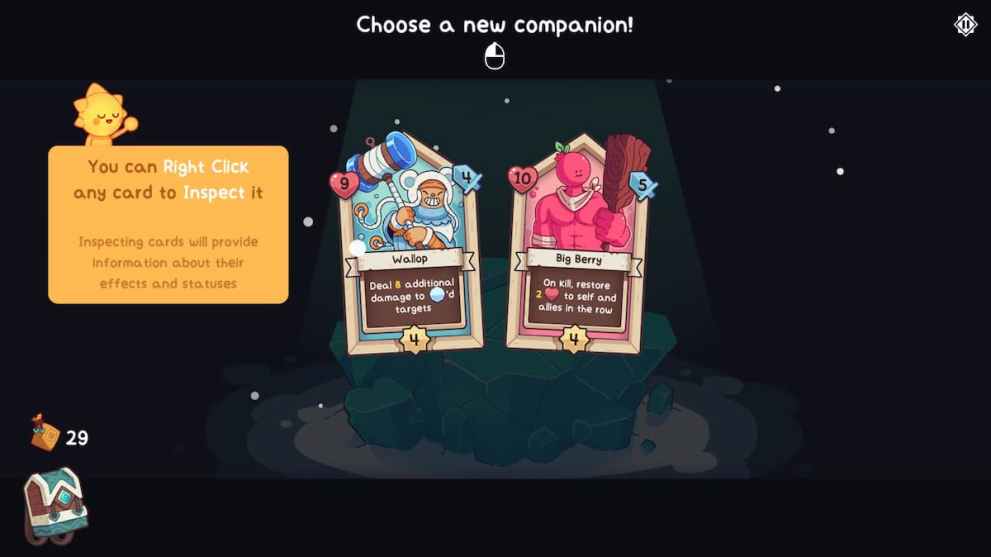Rogue-likes (and lites) are all the rage these days. They’re often praised for their challenging gameplay, and the unforgiving but compelling loop of going on procedurally generated runs, dying and losing everything you have, and repeating that entire process all over again. Generally speaking, rogue-likes are known for being rather frustrating experiences, but Wildfrost manages to turn every run into comfy, cozy fun.
Billed as a deck-builder rogue-lite title, Wildfrost opts for a lovely wintry setting. There’s snow everywhere, travelers are frozen in ice; in most other games, this would sound awful and torturous, but Wildfrost goes in the other direction and makes its entire world feel like Christmas. Not literally Christmas, mind you, but from the cartoonish art and character designs to the ability to throw snowballs at enemies to slow them down, this game is a pleasure to look at and to play.
At the start of each run, you’ll pick a character as your leader. Once your leader falls, the run is over and you’ll have to reset. In the demo build I played, I had to beat two mini-bosses and one final boss in order to complete a run. Each match starts with two lanes that you and your opponent can fill, and you’ll want to populate your lanes with your leader card, and any other companion cards you may have collected along the way.
Some leaders come with unique abilities, such as the ability to counterattack when hit, or to generate a shield when hit. Companions come with abilities as well, and the depth of Wildfrost starts to reveal itself to the player as you uncover various buffs, debuffs, and modifiers to play around with. Certain companions will provide shields for their entire lane when hit, while others prefer to stay in the backlines to buff up your damage over time.

The enemies themselves come with all sorts of troublesome abilities to deal with as well. Some will increase their attack each time they get snowballed, and others will continuously debuff your attack and defense each turn they get. The more companions you gather, the more critical it becomes to really think about how they synergize with each other, and whether they’ll do more harm than good against specific enemies.
During a run, you’ll have the chance to pick up charms (which serve as passive party-wide buffs), companions, and money. The enemies you encounter will change as well, and this helps to make each run feel a little different and fresher.
The battles are largely turn-based affairs, where you’ll spend turns deploying your leader and companions onto the field, and play cards to damage your foes. The leader and companions also have turn counters at the bottom of their cards, and they’ll execute their unique abilities whenever it’s their turn. While Wildfrost may look cute on the surface, it quickly proved to be a rather challenging experience as I played on.
I soon realized that managing the turn counters is critical to success, as your characters typically have to pass three or four turns before they’re able to take an action. During this time, you’ll need to keep an eye on the enemy’s turn counters too, and think carefully about whether your characters will have enough health to survive the next onslaught. It might be tempting to keep throwing snowballs at your foes to slow them down, but again, this isn’t a strategy that’ll work every time as your foes have ways to get around that too.

Being careless with your actions will result in a swift death for your companions, and I’m not ashamed to admit (okay, maybe a little bit) that I failed my first 10 runs or so before I finally got lucky and learned how to maneuver around my foes a little better. At any point during battle, you can also click and drag one of your character cards to the discard pocket to allow them to heal up. They’ll get reshuffled back into your hand eventually, but keep in mind that deploying them again will take another turn.
Thankfully, Wildfrost is a rogue-lite, which means that you get to keep some of your progress made during each run. Gold doesn’t carry over, but you can hit certain milestones across all your runs to upgrade your village. Upgrading the village will unlock various facilities for you, allowing you to access more types of companions, as well as charms to help make the runs a bit easier.
Even with all these upgrades, Wildfrost is still a tough game to play, and you’ll need to be patient and willing to deal with dying a whole bunch before you start to see some improvement. While I’m not necessarily the most patient player around, Wildfrost’s adorable aesthetic definitely helped to keep me going. No matter how many times I died, facing off against witches and baby snowmen never got old, and it’s just hard not to feel enthralled by the endearing character and enemy designs. The art is very reminiscent of Grindstone, except with cute penguins instead of gross monsters and I’m all about that.
The demo build of Wildfrost was way too short, and by the time I (finally) got to the end, I found myself wanting to see more of the game. Put me in front of a fireplace with a cozy blanket and Wildfrost on my Switch in winter, and I’ll be set for the end of the year.
